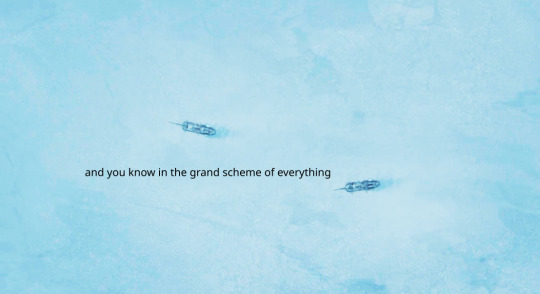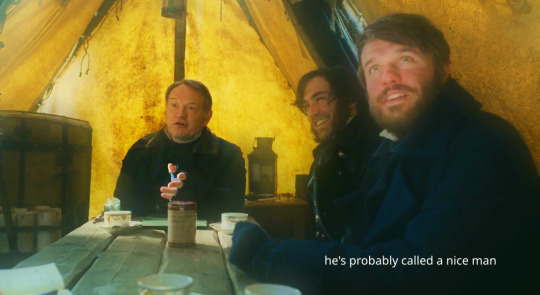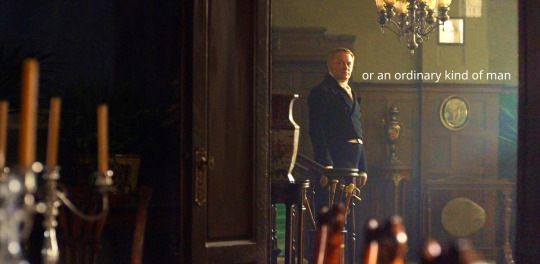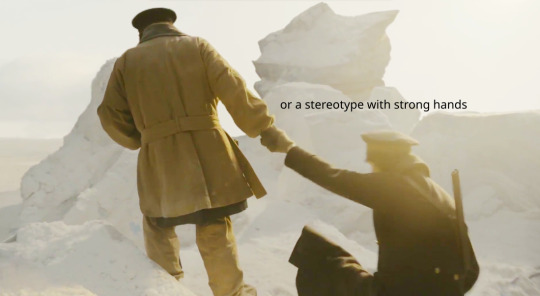#also let's not take the whole song as subtext but i think this verse carries the point well
Text




#not tagging bc then people will be blocking me for real#i was doing the shuffle song thing and i'm weak for this song#i wanted to do a larger edit but i want to make separated posts#but also it's a miracle krita didn't crashed. very happy this time updating the kernel only fucked up minor stuff#so cw before googling the song this edit takes that rape by proxy post as canon and if you listen to the song it's whats implied#song : romance by ex:re#also let's not take the whole song as subtext but i think this verse carries the point well
2 notes
·
View notes
Video
youtube
I have THOUGHTS about this, and they’re below the cut. I know I haven’t posted in like two years, but I really need to shout into the void about this.
So, this got released as a part of a series of short animations to promote World of Warcraft’s upcoming expansion, Battle for Azeroth, and I just CAN. NOT. STOP. WATCHING. The director, artists, and writer behind this short animation have basically created one of the most concise, yet immediately understandable character stories in their entire history (to an extent). It’s timed incredibly well, the lyrics aren’t filled with jargon beyond the two Named Locations (Kalimdor, the western continent and Theramore, a major city on said continent), and the symbolism fills in a LOT OF SUBTEXT that just makes this work. If you haven’t watched it yet, stop reading and go do that. Then watch it again while paying close attention to the lyrics and the imagery.
.
.
Done now? Let’s walk through some of the initial understanding you probably have of this, even if you’ve never touched Warcraft. First, the daughter of the sea the song references is the woman the short focuses on (who is Jaina, by the way). Second, she stood aside and allowed her father to be killed, which estranged her from her family and her people. Third, the skeleton moving her boat is either a stand-in for her father or is her father. Finally, by the end of the short, she seems to be accepting what the song bestows on her, claiming the title of “Daughter of the Sea” who one should beware of.
And that’s what you can grab from the song lyrics alone. What about the imagery alone? We start the short in what appears to be a kind of graveyard, where Jaina picks up a pendant and gives it to the skeleton for passage. Throughout this ride, when we can see Jaina, she is withdrawn, hidden, and almost appears ashamed of something (we can guess this is in reference to “The Admiral fell at Theramore because she left his side,” the last line Jaina herself sings). Following this, we get the ship graveyard, which along with the wisps and Jaina touching the water but avoiding the skull, seems to imply it’s connected to her shame. Then we get the story of the admiral, which I don’t really want to focus on, but then... OH THEN we get to some good stuff. For the first time since this has started, Jaina lifts her head out of her shame and her face is lit by sunlight after her father’s death fades out above her head. You don’t need any context, I think, to recognize a shift in perspective there. Jaina stands in sunlight, her shame behind her, facing the judgement of the sun. She also is facing judgement from the clouds that form faces, but let’s skip that for now. The judgement morphs then, as Jaina raises the very ship we saw earlier out of the waves, her father’s ship. The judgement she faced she turns into atonement by resurrecting what she allowed to die, or at least the symbol of it. Taking her place on the ship, which, since it’s her father’s, is indeed her ship now, the full claim of her title “Daughter of the Sea” is finished, and she no longer sees any need to be ashamed; she’s faced judgement for what she did and is atoning now.
Note, we have still not pulled any context from the game itself, and we still haven’t asked an important question when working in this type of art. How do the lyrics and imagery work together? There are plenty of properly timed moments in the lyrics which are surface-level. For example, the entirety of the second verse up to the line “And buried deep beneath the waves” does an excellent job of matching the story moments with the lyrics. There are three additional moments that I find excellent, though! First, when Jaina stops singing, and the sea shanty begins, notice that she’s surrounded by the ruins of several ships; the voices of the dead sailors that came with her father, the admiral, asking her “Why this? Why this? Oh Daughter of the Sea? Why this? Did you forget your seaside days?” reminding her that she didn’t just let her father die that day, but all the sailors he brought with him. Her choice did not just affect her father, and that is a part of the shame she carries, and must be a part of her judgement. Second, let’s go back to right after Jaina lifts her head out of shame. Remember how we skipped the clouds? That’s because the lyrics immediately tell you exactly who they are! “Betrayed by family!” While the lyric is clearly still speaking of the “Daughter of the Sea” betraying her father, the juxtaposition shows that at this moment, Jaina is facing the perceived judgement of her family, her people, the ones she betrayed by standing aside. Third, immediately after this we get the line “To his nation, with his last breath cried, Beware the Daughter of the Sea” right as Jaina’s eyes open and we see her use magic to raise her father’s ship from the sea. She’s not in shame anymore at this point, as we’ve already discussed; it’s something else now. While the lyric at the end of the short and her position on her father’s ship cement her complete acceptance of her title, you don’t really need those because of this moment right here. She already has accepted it, and raising her father’s ship from beneath the waves while her title rings out in the lyrics makes sure you know it before they make it even more obvious.
The only thing left that I haven’t really talked about is what prevents the “shame, judgement, atonement arc” from conflicting with the “Beware, beware the Daughter of the Sea. Beware, beware... of me“ line at the end. This is cleared up with the only spoken line in the whole short: “I’m listening now. Father.” In the past, she stood aside and let her father be killed; she’s listening now though, which implies she would not stand aside now. His enemies that she stood aside for are now her enemies. The final lines are not sung to caution her people, like the song itself is. They are sung to caution the “savage foes” that killed her father.
It’s beautiful, it’s concise, it’s well-timed, it’s got symbolism everywhere, and I note again that this didn’t require any in-game knowledge. Obviously there is more stuff that what I’ve written (hello, clear River of the Dead imagery), but this is what stuck out to me when I watched it. I just wanted to write this all out somewhere, so if you did decide to read this, thanks, and I hope the reading and the short itself resonates with you as it did with me!
Oh, and while I’m here, I should probably give at least a tiny bit of context:
Jaina had forged a peace with the orcs before her father arrived to “save his daughter’s life” and immediately started killing the orcs (for reasons that are understandable, though bad) without allowing Jaina to explain that peace was an option. To try and get that peace back, she helped a small force of orcs get to her father and they killed him. Thereafter, she was the primary force for peace between the two major powers of the world, the Horde (led by the orcs) and the Alliance (led by the humans). Eventually, the Horde got new leadership which was a bit more warmonger-y than the leader she had forged peace with, and so the Alliance got a bit more warmonger-y as well, stationing troops and military equipment in her city, which led to the Horde leader developing and deploying a weapon of total destruction on the city (the city was left a crater). Those wiped out included her lover and her apprentice, and the leader she had forged peace with had consistently ignored her pleas to restrain or remove the other leader from power prior to the bomb being deployed. From that point forward, she became increasingly anti-Horde, to the point where (as you see in the video) she understood her father’s decision to immediately kill the “savage foes.”
So anyway, that additional context should help fill in some stuff if you feel I’m pulling too much from the imagery and lyrics alone. Again, if you’ve read all this I really appreciate it. Sorry for the wall of text, but that’s why it’s hidden behind a Read More!
39 notes
·
View notes
Note
Hi Medusine! If you’re still up for the DVD commentary (and if you don’t mind that I cheated and it’s actually closer to 600), I’d love to read your commentary on the part of Impossible Tasks that starts with “As the last notes died in Silver’s throat” and ends with “Or you’ll never be a true love of mine,” near the end. I know you posted that a while ago, so if you no longer have time for it or don’t have much to say about this piece, no worries! :)
Oh wow, okay! I’ve never done this and tbh I don’t listen to many DVD commentaries, but let’s try! :D (sorry it’s late, Christmas prep delays)
And it’s long, so most of it goes under a read-more!
Impossible Tasks - DVD Commentary
Okay so just to situate the action, this story takes place in Season 3, while Flint & co are sailing to fetch Jack and the treasure in Nassau, and before Silver kills Dufresne.
As the last notes died in Silver’s throat, the harmony still buzzing within him, he waited for Flint to start the next verse. His stomach dropped when silence fell in the room again. Silver opened his eyes. Flint had straightened slightly on his seat, and put his quill down. Those were the only signs that the song hadn’t been a dream.
Until this point, Silver had been in a sort of daze, singing in harmony with Flint without really thinking about it. They were both caught sort of off-guard while they were half-dozing, which allowed them to be more in sync because they weren’t holding back. Silver was enjoying himself, and feels a little disappointed that the moment is over.
“I didn’t know you could sing,” Silver said quietly.
And yes he’s pretty much in awe of every new thing he finds out about Flint. S3 is a time when they’re discovering a lot about themselves and each other, and for Silver especially it’s about going past whatever preconceived notions he had about Flint.
Flint shrugged. “No better or worse than most sailors.”
Silver had heard most sailors sing and he disagreed heartily with that statement, but he let it slide.
Flint definitely sings better than your average sailor. Have you ever heard Toby sing? He’s not bad at all. In my headcanon, Flint learned a lot of things from his Irish grandfather, including singing (though this song isn’t Irish).
“That wasn’t a sea shanty, though,” he said instead.
“No, it wasn’t.”
It was a love song. Only now did Silver realise exactly what they’d been singing. He played the song back in his mind, making sense of it now that Flint had filled the gaps in the lyrics.
And this is where the plot thickens for Silver. This song had been haunting him for a while, he had no idea why, and only now that Flint has provided the rest of the lyrics does he realise that a love song has been running through his mind since he’s been in the Maroon camp with Flint.
“An impossible love, then,” Silver murmured to himself.
“Mm?”
He hadn’t meant to say it out loud. “The song. It’s about never being worthy of someone’s love. There is no land between the sea and the sand. Lambs don’t have horns, and you can’t sow a field with a single peppercorn.”
So yeah, Scarborough Fair is exactly about that. Its lyrics can be sung as a duet between a man asking his beloved to sew an impossible shirt for him, and a woman asking her beloved to harvest an impossible plot of land for her. I chose that song for this prompt because it was both the perfect theme and also it’s likely it existed in this time period (though possibly with a different melody/lyrics to what we know now).
Silver is only realising now that it’s not just a love song that’s been running through his mind, but on where the song’s protagonist has to do something which is absolutely impossible, in order to convince the other of his love. Basically, the other’s expectations are so high that he’ll never be worthy. Which is pretty familiar for Silver from someone as demanding as Flint (or Madi, for that matter).
Flint turned around slowly. Silver braced himself for a sombre glare, cutting words, perhaps even some snapped order to shut up about songs. But there were no traces of that on his face. Instead there was a gleam in his eye that Silver had never seen before.
“You were the one humming it, you know,” Flint said with a hint of a smile.
The observation crashed onto Silver like a wave, robbing him of air, flattening him to the sand.
Flint hasn’t missed the significance of Silver singing this song either. He’s a big reader, he analyses text and subtext, and here he’s figured out that if Silver’s thinking about that, he might have it on his mind. And this is scary for Silver. He’s revealed himself without wanting to and it’s a shock for him. It’s like Flint knows his mind before he even does.
“Just the sober and grave part,” he said defensively, but now that he looked into Flint’s face, Silver realised just why those words had popped into his head. He thought about Flint too often for his own good, these days.
“And the true love part,” Flint pointed out, his tone casual but his face quite earnest.
So of course, a scared Silver tries to weasel his way out of what he considers to be a too revealing situation, but somehow manages to make it worse. Sober and grave are pretty much the description of Flint’s face (and, quite often, Madi’s) so he pretty much walked straight into that one. Flint can’t help needling him a little further - at this point I think he’s sort of testing the waters to see where this is going, if there’s any actual significance to Silver singing the song or not. And given Silver’s defensive reaction, he probably has all the answers he needs.
A lil note here about the lyrics I chose. The verse a lot of people know nowadays is “parsley, sage, rosemary, and thyme”, but those are the 19th century lyrics and could be a corruption of older lyrics. I thought that “sober and grave” were absolutely perfect in this story, so I opted for those.
“Well, it rhymes,” was the best retort Silver could find. Cold sweat was beading at his forehead, and god, he hoped he wasn’t blushing under Flint’s terrible gaze. Those eyes were always trying to bore down into places Silver never wanted anyone to see.
Silver is still grasping at straws, trying to make out like the song is nothing. Chances are he’s a bit sweaty and a bit blushy and Flint can see it, which is why he’s quite kind to him in the following section.
“It’s an assonance, rather than a rhyme, but fair point,” Flint said. He smiled a little, and Silver couldn’t for the life of him figure out the look on his face, except that it was gentle and terrifying all at once.
This is probably my favourite line in the whole fic, because although these two idiots are drowning in the subtext of their conversation, Flint is still A Nerd and can’t resist correcting Silver about the difference between rhyme (where the vowel and consonant sounds are identical, such as “time” and “rhyme”) and assonance (where only the vowel sounds are identical). Which nobody but nerds cares about, but Flint can’t help flaunting his knowledge (and obvs neither can I XD).
“If you don’t mind, I think I’ll doze for a while longer,” Silver said, shifting on the bench so that he faced the window rather than Flint. It was either that or trying to high-tail it out of the cabin, and he wasn’t sure his sore leg would carry him.
Flint gave a small nod, and turned back to his desk. Silver relaxed when he heard the scratch of Flint’s quill on the paper. He felt like someone who’d just been licked by a whirlwind and barely resisted being drawn in.
At this point Silver feels very vulnerable. He’s revealed something to Flint that he wasn’t entirely aware of himself, and he sees Flint’s questions like something akin to interrogation, even though Flint was actually really gentle about it. The conversation is making him more and more ill-at-ease, he’s not ready to confront whichever feelings he might have for Flint. So he escapes into sleep.
Just as he was drifting off again, Flint’s soft voice rose in the room. Silver made no sound, listening as his heart burst into a flutter, barely daring to breathe.
“If you say that you can’t, then I shall reply, Sober and grave grow merry in time, Oh, Let me know that at least you will try, Or you’ll never be a true love of mine.”
The ending to the song, which isn’t always that well-known, is one of acceptance. It doesn’t matter that the lover can’t actually complete the impossible tasks, so long as he accepts to try.
Flint is sending a message to Silver here. It’s an answer to Silver’s comment about this love being impossible. As long as Silver is his ally, as long as he tries, Flint will accept him, it’ll be good enough for him. This could be seen as him accepting Silver, giving him a way into his heart. But it could also be seen as a sort of threat: if Silver doesn’t try to do the impossible, he’ll never gain Flint’s love. The story ends with the ball firmly in Silver’s court, and Silver quite aware of it - and, of course, terrified.
#lyricist-in-love#my fic#meta#meme#thanks for the ask! =)#i'm not sure what I was doing but I did it XD#hope it's not too dumb
5 notes
·
View notes